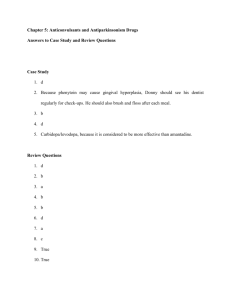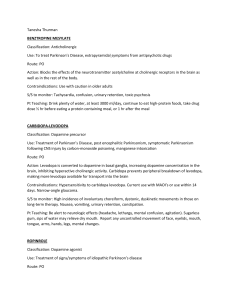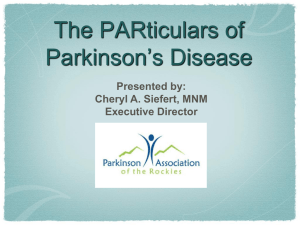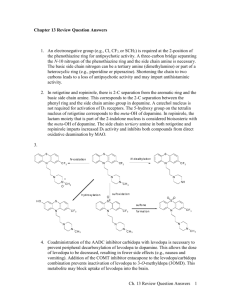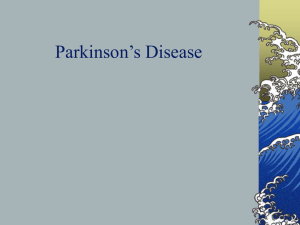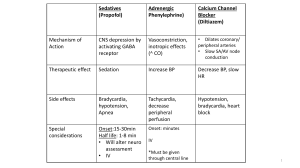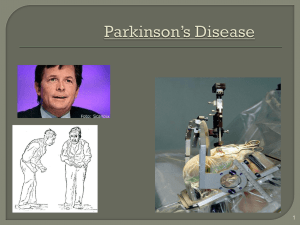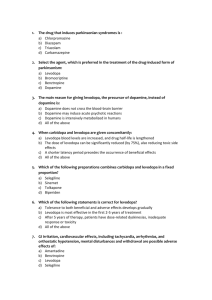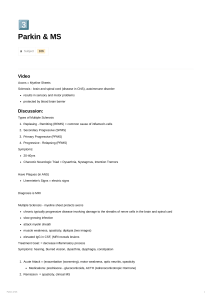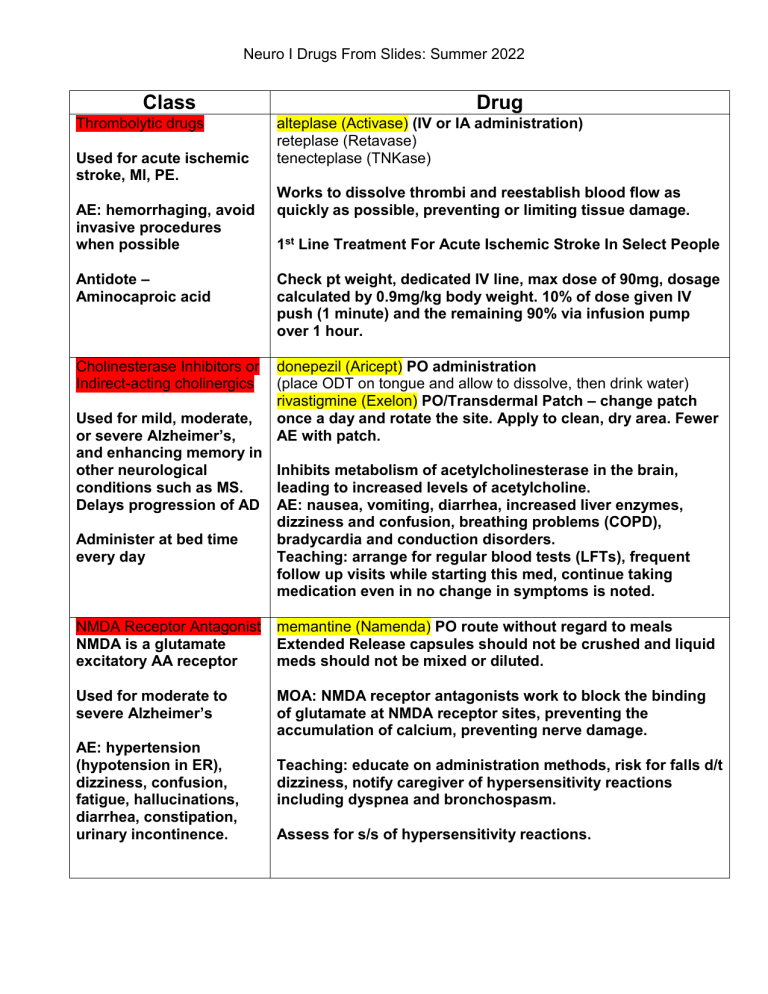
Neuro I Drugs From Slides: Summer 2022 Class Thrombolytic drugs Used for acute ischemic stroke, MI, PE. AE: hemorrhaging, avoid invasive procedures when possible Drug alteplase (Activase) (IV or IA administration) reteplase (Retavase) tenecteplase (TNKase) Works to dissolve thrombi and reestablish blood flow as quickly as possible, preventing or limiting tissue damage. 1st Line Treatment For Acute Ischemic Stroke In Select People Antidote – Aminocaproic acid Check pt weight, dedicated IV line, max dose of 90mg, dosage calculated by 0.9mg/kg body weight. 10% of dose given IV push (1 minute) and the remaining 90% via infusion pump over 1 hour. Cholinesterase Inhibitors or Indirect-acting cholinergics donepezil (Aricept) PO administration (place ODT on tongue and allow to dissolve, then drink water) rivastigmine (Exelon) PO/Transdermal Patch – change patch once a day and rotate the site. Apply to clean, dry area. Fewer AE with patch. Used for mild, moderate, or severe Alzheimer’s, and enhancing memory in other neurological Inhibits metabolism of acetylcholinesterase in the brain, conditions such as MS. leading to increased levels of acetylcholine. Delays progression of AD AE: nausea, vomiting, diarrhea, increased liver enzymes, dizziness and confusion, breathing problems (COPD), Administer at bed time bradycardia and conduction disorders. every day Teaching: arrange for regular blood tests (LFTs), frequent follow up visits while starting this med, continue taking medication even in no change in symptoms is noted. NMDA Receptor Antagonist NMDA is a glutamate excitatory AA receptor memantine (Namenda) PO route without regard to meals Extended Release capsules should not be crushed and liquid meds should not be mixed or diluted. Used for moderate to severe Alzheimer’s MOA: NMDA receptor antagonists work to block the binding of glutamate at NMDA receptor sites, preventing the accumulation of calcium, preventing nerve damage. AE: hypertension (hypotension in ER), dizziness, confusion, fatigue, hallucinations, diarrhea, constipation, urinary incontinence. Teaching: educate on administration methods, risk for falls d/t dizziness, notify caregiver of hypersensitivity reactions including dyspnea and bronchospasm. Assess for s/s of hypersensitivity reactions. Neuro I Drugs From Slides: Summer 2022 Acetylcholinesterase and NMDA Receptor Antagonist COMBO DRUG Used in moderate to severe dementia Dopamine Receptor Agonists Used for Parkinson’s or Restless leg syndrome. The medication may lose its overall effectiveness after 2-5 years, so the dosage may need to be increased Administer with or just after foods to reduce N/V (foods without protein) Not given with MVD that contain Pyridoxine (B6). Not administered with a high protein diet. Ensure adequate hydration of pt. donepezil-memantine (Namzaric) This medication is for patients who are stabilized on 10mg of Donepezil once daily but are NOT taking Memantine AE: heart block, bradycardia, risk for falls levodopa-carbidopa (Sinemet) shorter ½ life of 1-3 hours so typically repeated 3-4 times daily MOA: Levodopa is the precursor of Dopamine. After Levodopa crossed the blood brain barrier, it converts to Dopamine in the brain. AE: tachycardia, widened QRS, palpitation, orthostatic hypotension, nausea, vomiting amantadine (Symmetrel) Anti-Parkinson’s and antiviral agent increase Dopamine levels AE: dizziness, insomnia apomorphine hydrochloride (Apokyn) “Off time” episodes of PD Off time is periods when the medicine is not adequately controlling the s/s (seen in advanced PD) Monitor BP to rule out hypertensive crisis ropinirole (Requip) stimulates Dopamine receptors in the brain. Used in caution with hepatic failure – can increase the AE selegiline hydrochloride (Eldepryl) PO and ODT - Blocks MOA inhibitors, inhibiting the metabolism of Dopamine, which increases levels of Dopamine. The blocking of MOA equals blocking the deactivation of Tyramine, which increases levels of Tyramine – leads to sudden release of norepinephrine ***hypertensive crisis possible Catechol-Omethyltransferase (COMT) inhibitors Administered in conjunction with Levodopa-Carbidopa for the Mx of idiopathic PD Teaching: taper the medication, perform LFTs, use barrier contraceptives tolcapone (Tasmar) entacapone (Comtan) MOA: COMT metabolizes 10% of Levodopa. When you block COMT, the metabolism of Levodopa is decreased, helping to increase the plasma concentration or duration of action of Levodopa Admin: decrease Levodopa dosage, discontinue Tolcapone after 3 weeks if no benefits are present. Tapering REQUIRED. AE: fulminant liver failure, disorientation, hallucinations, psychosis. COMT medications are NOT administered with MAO inhibitors due to risk of hypertensive crisis***** Neuro I Drugs From Slides: Summer 2022 Catechol-Omethyltransferase Inhibitor and Decarboxylase Inhibitor/Dopamine Precursor Used for idiopathic Parkinson’s disease Centrally Acting Anticholinergic Used as an adjunctive therapy for all forms of Parkinson’s Disease AE: anticholinergic side effects levodopa-carbidopa-entacapone (Stalevo) MOA: Levodopa is a Dopamine precursor – Carbidopa inhibits peripheral breakdown of Levodopa – Entacapone increases Levodopa levels. AE: diarrhea/drug-induced colitis, nausea, vomiting, somnolence, increased risk of melanoma, ortho. Hypotension Teaching: report hallucinations and diarrhea. Urine may become brownish orange (normal) – increased risk of falls due to orthostatic hypotension. Admin: Levodopa dosage should be adjusted before the conversion to Stalevo. Presence of dyskinesia necessitates a drug adjustment, distribute protein intake to avoid fluctuation of Levodopa absorption. benztropine mesylate (Cogentin) MOA: normalizes the imbalance of acetylcholine and dopamine in the basal ganglia of the brain to reduce tremor and rigidity – suppresses secondary symptoms of PD such as drooling Admin: give with food to minimize GI upset, may take before meals in cases of dry mouth or after if drooling. Patient should void prior to administration to avoid urine retention, reduce the dose in summer months (overheating)
